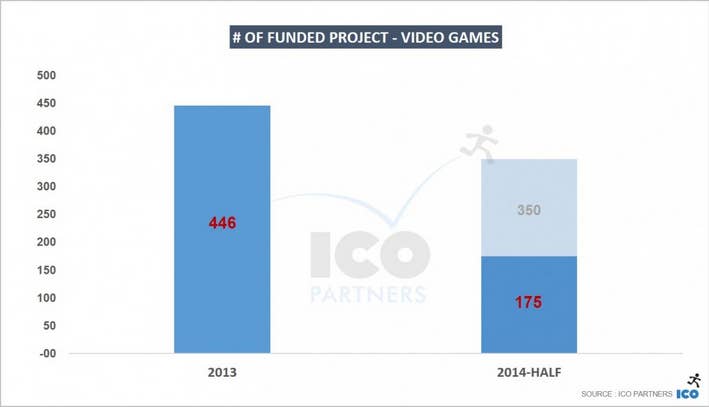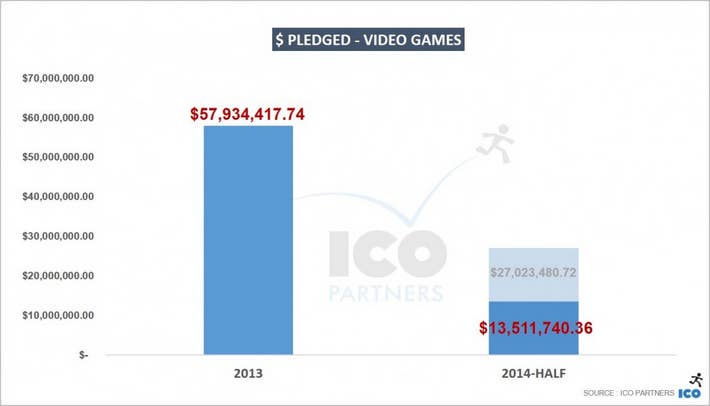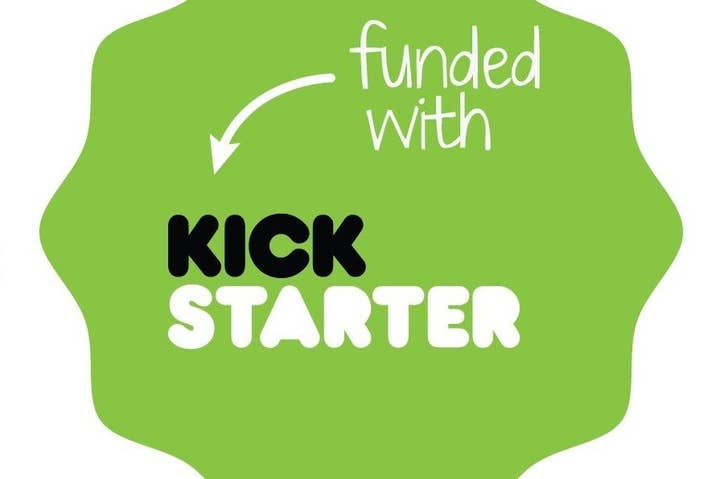ICO Partners report suggests Kickstarter is in decline
New data shows less money going to fewer games projects
New data on games on Kickstarter has shown that both the number of projects and the amount of money pledged to them are falling, with Kickstarters in 2014 expected to raise less than half of the funds secured in 2013.
The data comes from consultancy firm ICO Partners, which has been analysing Kickstarter over the course of the first half of 2014. During that period, its analysts have discovered a sharp drop in the number, scale and success of games projects.
The numbers are necessarily extrapolated from six months of data, but barring a rapid uptick of both projects and funding, ICO Partners expects this to be the first year that gaming's share of Kickstarter shrinks - but does that mean we've passed peak crowdfunding?
In terms of the raw number of successfully funded projects, ICO expects a drop of around 20 per cent from 2013 for the current year, resulting in 350 successful campaigns compared to last year's 446. That, as analyst Thomas Bidaux notes is "a decline certainly, but not a terrible collapse," especially when we consider that 2013 was the best year ever seen for games on the service.

However, where Thomas does see some cause for concern is in the amount of money being pledged to those projects. In the first half of 2014, $13,511,740.36 was pledged to games projects on Kickstarter. That's a lot of cash, but it pales in comparison to the total for last year. If we double the number for January-June 2014, we get $27,023,480.72 - again, an impressive commitment from backers. But, as ICO's research shows, that's less than half of 2013's total of $57,934,417.74.
Bidaux sees three major factors in that decline: the lack of low-hanging fruit, a waning enthusiasm - partly driven by some high-profile failures - and the introduction of some serious and well publicised alternatives.
"If you consider that there have been 21 projects getting more than $500k in funding in 2013 and only 3 in 2014 so far, you might feel that Kickstarter is done for large projects," says Bidaux. "But looking at the projects profiles, a lot of those big hits in 2013 were banking on strong 'brands': Torment, Mighty Number 9, Elite, Camelot Unchained, Dreamfall, Richard Garriott's Shroud of the Avatar, etc. The three projects that raised over $500k in 2014 are Kingdom Come: Deliverance, Amplitude and Unsung Story. Hardly the wave of known brands that flooded Kickstarter last year."

Those big names make for good headlines and bring in a lot of cash, but Bidaux also believes that they have a halo effect, bringing people to the Kickstarter site, encouraging registration and engagement, and allowing the system to recommend other similar projects to the backers, helping them to discover smaller projects which they may have previously passed over. That said, those big names accounted for over half of 2013's funding total alone, so it may be as simple as a gap in that schedule.
As Bidaux points out, there's also a bit of Kickstarter fatigue. Journalists are no longer excited by the word in an email subject and backers who have already invested in projects which are yet to see release might be less willing to speculate further on other games which are still years away. In addition, some relatively big name projects which failed to reach fruition, like YogsQuest and Clang, may have left something of a sour taste.
Perhaps the biggest factor, however, could be that eternal curse of the first to market - that a better known, better funded company with a bigger audience will adapt your idea and enter your market, pulling cash and attention away from your business. Enter Valve and Steam Early Access.
There are clear differences between the two, obviously. In fact, many games that go on to participate in Early Access have already achieved funding via Kickstarter. However, Early Access allows developers to maintain a longer, closer point of contact with backers/customers, on a well trusted and prevalent platform which is geared up for regular updates and community discussion. Whilst other crowdfunding alternatives like IndieGoGo may not have troubled Kickstarter too much, Early Access has had a definite impact.
All data and graphs courtesy of ICO Partners

